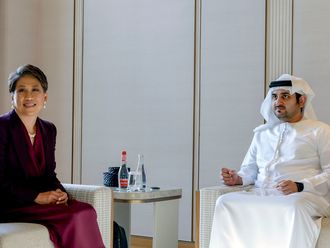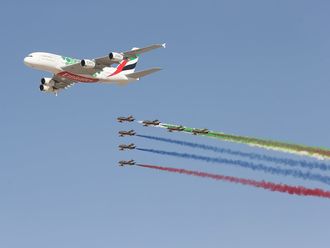Dubai: Sheikh Hasina, Prime Minister of Bangladesh, was born on 28 September, 1947 at Tungipara under Gopalganj district. She is the eldest of five children of the Bangladesh's founding father Bangabandhu Sheikh Mujibur Rahman.
With politics in her blood, she participated in student movements in the 1960s. She was elected Vice President of the Students Union of Government Intermediate Girl's College as a member of the student's League Unit of Dhaka University and Secretary of the Students League Unit of Rokeya Hall.
She graduated from the University of Dhaka in 1973.
When Sheikh Mujibur Rahman along with his family was martyred on 15 August 1975, Sheikh Hasina and her sister Shaikh Rehana survived as both were abroad. Sheikh Hasina was unanimously elected President of Bangladesh Awami League in 1981 while in exile abroad.
She led the historic mass movement from 1983-1990 against a military junta and later steered her party to power in 1996.
As Prime Minister, Sheikh Hasina adopted a number of policies for overall development of the nation including poverty alleviation, expanding the reach of mobile telecom, ICT sector and agriculture development. During her first tenure in office, her government signed a 30 year Ganges Water Sharing Treaty with India, ended insurgency in Chittagong Hill Tracts and opened Bangabandhu Bridge on the river Jamuna - improving communication.
She played an instrumental role in pushing for a UN General Assembly to adopt a far-reaching resolution on the role of microcredit in the eradication of poverty as well as declaring February 21 as the International Language Day - that started with the Bengali Language Movement of 1952.
Along with poverty eradication, she has focused on the empowerment of women and has successfully completed legislation to ensure adequate representation of women in the local government bodies, leading to the election of more than 14,000 women to these bodies in 1997.
Hasina's Bangladesh Awami League led a grand alliance to win a landslide victory in the 9th Parliament Election on December 29, 2008 with 262 seats out of 299 in the National Parliament, and formed government on January 5, 2009 for the second time. During the last two years, her government has reformed education system, finalised a public-private partnership framework to roll out mega projects, launched the biggest infrastructure project - the Padma Bridge, and is in the process of adding about 10,000 megawatt worth of power to the national grid in 5 years and expand online services under a Digital Banglagesh platform.
Dubai Shaikh Hasina, Prime Minister of Bangladesh, was born on September 28, 1947 at Tungipara under Gopalganj district. She is the eldest of five children of Bangladesh's founding father Bangabandhu Shaikh Mujibur Rahman.
With politics in her blood, she participated in student movements in the 1960s. She was elected vice-president of the Students Union of Government Intermediate Girl's College as a member of the student's League Unit of Dhaka University and Secretary of the Students League Unit of Rokeya Hall.
She graduated from the University of Dhaka in 1973. When Shaikh Mujibur Rahman along with his family was martyred on August 15, 1975, Shaikh Hasina and her sister Shaikh Rehana survived as both were abroad. Shaikh Hasina was unanimously elected President of Bangladesh Awami League in 1981 while in exile abroad.
She led the historic mass movement from 1983-1990 against a military junta and later steered her party to power in 1996. As Prime Minister, Shaikh Hasina adopted a number of policies for overall development of the nation including poverty alleviation, expanding the reach of mobile telecom, ICT sector and agriculture development. During her first tenure in office, her government signed a 30-year Ganges Water Sharing Treaty with India, ended insurgency in Chittagong Hill Tracts and opened Bangabandhu Bridge on the river Jamuna.
She played an instrumental role in pushing for the UN General Assembly to adopt a far-reaching resolution on the role of microcredit in the eradication of poverty as well as declaring February 21 as International Language Day — that started with the Bengali Language Movement of 1952.
She has focused on the empowerment of women and has enacted legislation to ensure adequate representation of women in local government bodies, leading to the election of more than 14,000 women to these bodies in 1997.
Hasina's Bangladesh Awami League led a grand alliance to win a landslide victory in the 9th parliamentary election on December 29, 2008.












